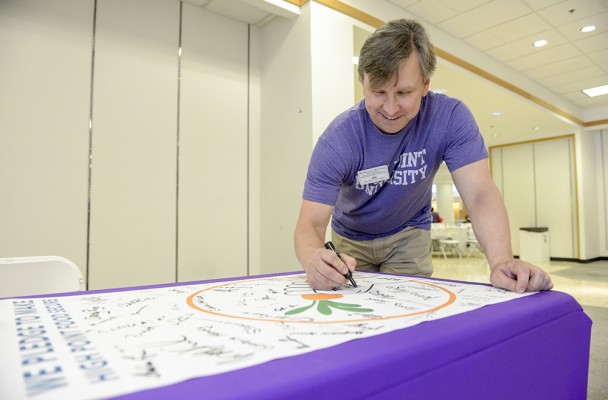Second annual Food Summit works to reduce food insecurity in High Point

HPU professor Dr. Brandon Lenoir signs a pledge to help reduce food insecurity in the community. Photo by: highpoint.edu
By Devon Wilkinson // Staff Writer
When High Point University students are hungry, they have numerous options to choose from, but not everyone in the community has healthy options for food. Right outside our gates are thousands of people struggling to feed their families every day.
According to the Food Research and Action Center, the city of High Point has a food deprivation of 23 percent. To decrease that percentage, HPU teamed up with High Point residents, the Greater High Point Food Alliance and the local Food Lion to host the second annual Food Summit at the HPU Community Center. On March 18 and 19, the Food Summit served over 400 people in need as a way to ensure that the people of High Point get the amount of food they need.
“We want to get rid of the hunger problem,” said Rev. Dr. Joe Blosser, assistant professor of religion and philosophy and the Robert G. Culp director of service learning at HPU and member of the GHPFA.
High Point is considered a food desert, which means that there are various areas within the city where residents do not have access to supermarkets and depend on convenience stores to buy their groceries.
The Food Summit is also working to provide the people in the community with healthy and nutritious foods by increasing community gardens in the area. These gardens are open to everyone, another way the Food Summit aims to provide healthy meal options to High Point residents and improve overall quality of life.
Although food is a large aspect of it, the Food Summit does not want food to be its only contribution to the community. They also want to provide food education through cooking classes and teaching urban agriculture so that those affected by hunger can begin to break the cycle and gain food security in the future.
“I love being here and being able to participate in the Food Summit and help out in any way that I can,” HPU student Jenna Rosenbloom said. “I think that this Food Summit is going to bring people together and help people in the community see that there are agencies and organizations in the community that truly want to help them. I love seeing people come to this and then walk out of here feeling much better about their food situation.”
Though there is work being done to combat the issue, food insecurity is still prevalent in the community and it is still necessary to work at it in the future before the problem is completely gone.
“It has a large impact on the community, and university students have the power to make an impact now,” Blosser said.